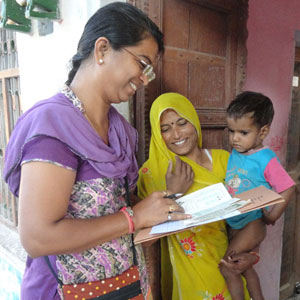Hands-on CDC training boosts researcher skills
July / August 2014 | Volume 13, Issue 4

Photo by Dr. Kayla Laserson/CDC
CDC training programs have expanded the global
network of epidemiologists able to detect and
respond to disease outbreaks.
Integral to the CDC's progress in protecting and promoting health globally are the research professionals in other countries who are qualified to monitor local disease activity. To help train these experts, the CDC has launched programs in 69 countries that have produced more than 2,800 graduates - a large portion of whom hold government posts in their home countries. Many are in leadership positions such as national epidemiology directors or regional surveillance department heads.
The CDC's major initiative for helping health ministries build their own training and capacity is called the Field Epidemiology Training Program (FETP). Its sister program, the FELTP, includes either a laboratory management specialty or other focus such as noncommunicable diseases or veterinary medicine. Each program is tailored to meet a country's particular health needs based on its culture, national priorities, established relationships and existing public health infrastructure.
FETPs provide two-year, full-time training opportunities in applied epidemiology. Participants follow residency programs similar to those established for medical students in hospitals around the world, based on learning through doing. Trainees spend a quarter of their time in the classroom and the rest in the field conducting disease surveillance, outbreak response, system evaluation and other activities.
For example, in Mozambique, trainees were on hand to watch for disease occurrence when severe flooding struck in 2013. (Learn more about CDC's work in Mozambique.)
In Guatemala, another program is training participants to study bats, which are common vectors for various diseases affecting humans.
Noncommunicable conditions also benefit from CDC-supported training efforts. In Kenya, a program is investigating the prevalence and causes of neural tube birth defects. Study results were so compelling, the Kenyan government adopted a policy to fortify foods with folic acid - a nutrient that reduces the risk of these types of birth anomalies.
In addition to its routine health strengthening activities, CDC provides emergency support for outbreak detection and response. For instance, when cholera erupted in Haiti in 2010, the agency rapidly responded, setting up a cholera laboratory within 48 hours of the first diagnosis. It also deployed expert medical and epidemiology assistance from the agency's offices in Atlanta and Guatemala to assist Haiti's health ministry. The local FETP trainees and graduates also played an essential role in the response, adding their expertise and local knowledge.
More Information
To view Adobe PDF files,
download current, free accessible plug-ins from Adobe's website.